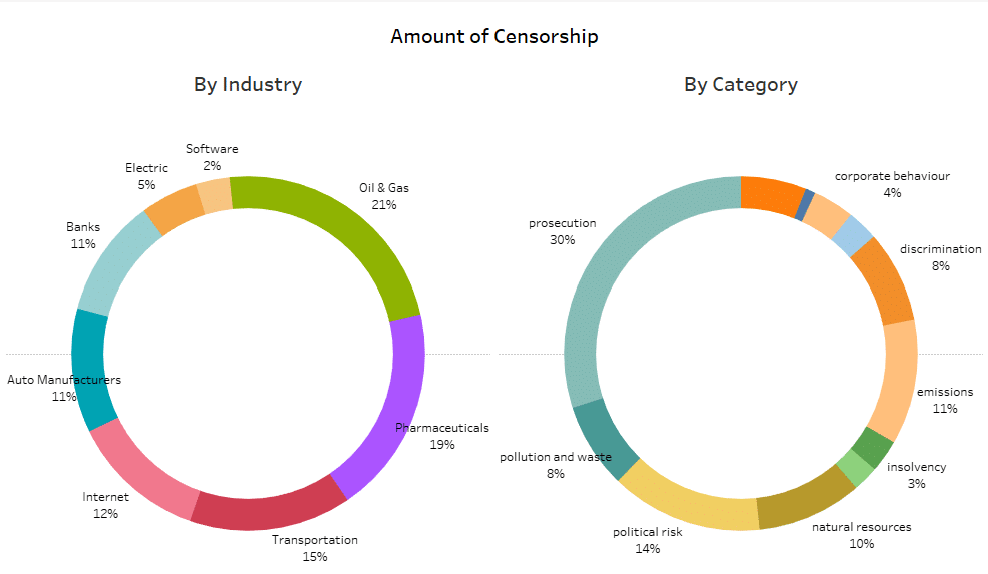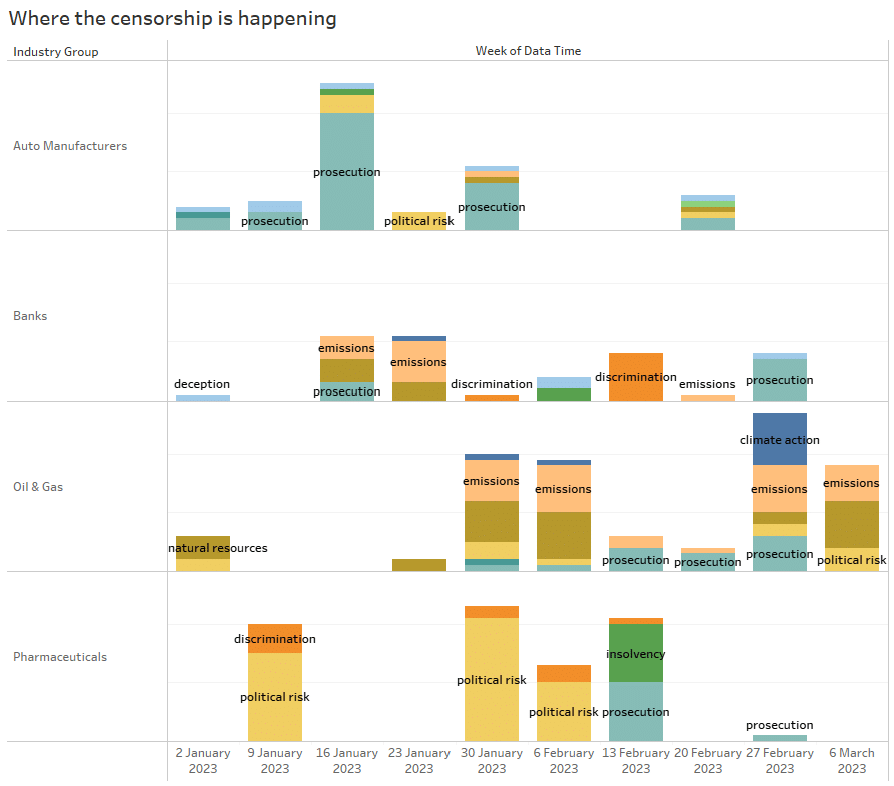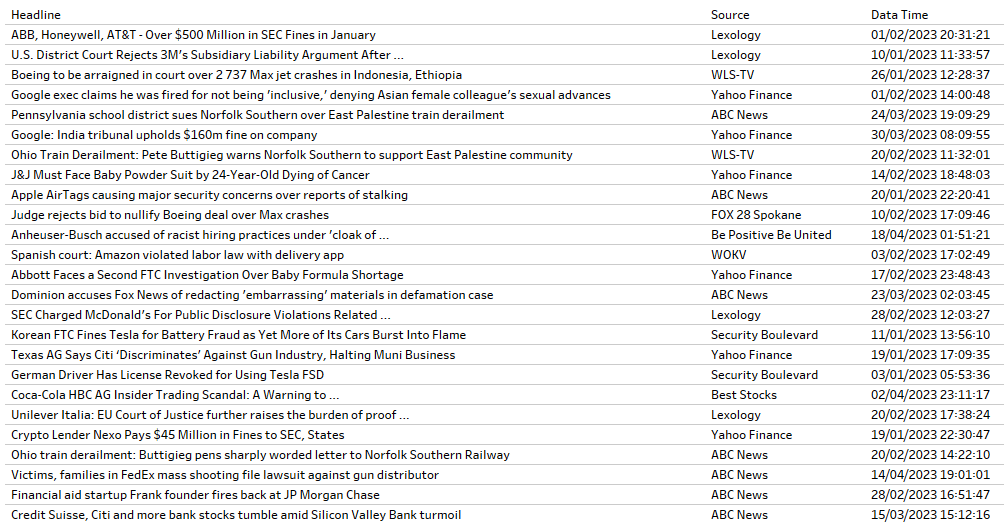In the realm of journalism, the pen is lauded as mightier than the sword, yet in the contemporary media landscape, it finds itself increasingly outmatched by the weight of corporate influence and in some cases – corporate censorship.
Corporate censorship in media, a multifaceted and often subtle phenomenon, reveals the complex interplay between the interests, policies, and power dynamics that shape the information reaching the public. This article looks at the mechanisms through which corporate censorship manifests, its repercussions on news reporting, and the vital discourse on safeguarding journalistic integrity and the information that reaches the reader.
Ownership influence
The influence of ownership is perhaps the most direct conduit for corporate censorship. Media entities under the umbrella of larger corporations might encounter pressures to tailor their content to the broader interests of their parent company. This alignment often results in the dilution or outright omission of stories that could cast a shadow over the corporation or its affiliates. The consequence is a landscape where certain narratives are amplified while others are silenced, skewing the public’s perception and understanding.
Owned by Rupert Murdoch, News Corporation has often been criticised for promoting political agendas aligned with Murdoch’s views across its media outlets, including Fox News. This has raised concerns about the impact of ownership on editorial content and the potential suppression of dissenting viewpoints.
Advertising pressure
Media’s reliance on advertising revenue introduces another layer of complexity. Advertisers, wielding significant financial power, can indirectly dictate content by threatening to withdraw advertising dollars from outlets that publish content deemed offensive or alienating. This dynamic fosters a form of self-censorship among media companies, where economic survival is pitted against editorial freedom.
Historically, CBS almost didn’t air an interview with a whistleblower from the tobacco industry on “60 Minutes” due to fears of a legal backlash under tortious interference laws, highlighting how advertising and potential legal pressures from a powerful industry can influence editorial decisions. And remember when The Guardian reported that HSBC stopped advertising with the title following its coverage of the bank’s involvement in a tax avoidance scandal?
Editorial policies and legal threats
Media outlets might establish editorial policies that reflect their vested interests, directly influencing how certain topics are reported—if they’re reported at all. Moreover, the spectre of legal action, whether through defamation lawsuits or other legal threats, serves as a potent deterrent against negative coverage, compelling media outlets to tread lightly around stories that could provoke corporate ire.
The spectre of legal threats further complicates this landscape. Even when media outlets are in possession of verifiable facts, the potential cost of defending against legal challenges—regardless of the merits of the case—can lead to self-censorship. This is particularly true in jurisdictions with stringent libel laws, where the financial and reputational risks of legal entanglement can coerce media into avoiding stories that are in the public interest but might provoke corporate ire.
An example of this was in the wake of the Cambridge Analytica scandal in 2018, Facebook threatened to sue The Observer (part of The Guardian Media Group) if it published its story on how personal data of millions of users was harvested and used in political campaigns. The story was published, leading to significant fallout for Facebook.
These dynamics highlight the challenges faced by the media in maintaining editorial independence and journalistic integrity. The influence of vested interests and the deterrent effect of legal threats can result in a cautious approach to reporting, especially on topics that could expose media outlets to financial or legal repercussions. This environment can stifle investigative journalism and hinder the media’s role as a watchdog, ultimately affecting the public’s access to information and undermining the foundation of informed democratic discourse.
Politicised topics
In the current media landscape, several topics have become so heavily politicised that media outlets may shy away from reporting on them, either to avoid controversy or because of the polarised nature of the public discourse surrounding these issues. A good example of this is climate change/net zero. Despite scientific consensus, the topic can be contentious, with debates often reflecting political ideologies rather than scientific discussion. Meanwhile, immigration can be a lightning rod for political debate, with media sometimes avoiding in-depth coverage that might challenge the prevailing narratives of political factions which their media outlet is affiliated with.
The result of this cautious approach is a media environment where critical issues are sometimes not given the comprehensive and nuanced coverage they deserve. This can hinder public understanding and dialogue, creating an information ecosystem where echo chambers and misinformation can thrive. For democracy to function effectively, it is essential for the media to bravely tackle these politicised topics, offering balanced, factual, and in-depth reporting that transcends political affiliations and ideologies. Such an approach would not only enhance public discourse but also empower citizens to make informed decisions based on a more holistic understanding of complex issues.
Access journalism and economic censorship
Access journalism and economic censorship present significant challenges to the integrity of the media landscape. In the quest for exclusive content, some media outlets may engage in practices where editorial independence is compromised for the sake of securing interviews, insights, or information directly from sources within corporate entities, government officials, or celebrities. This trade-off can lead to coverage that is overly favourable or uncritically promotional towards the source of the information, as the media outlet may fear losing future access to valuable content if it portrays the entity in a negative light. As a result, the journalistic duty to critically assess and report is often sidelined in favour of maintaining beneficial relationships with high-profile sources.
Economic censorship refers to the subtle yet pervasive influence of financial considerations on the selection and framing of news stories. In an environment where media outlets are increasingly driven by the need to generate revenue through advertising and clicks, there is a tendency to prioritise content that is likely to attract a large audience or appeal to advertisers. Consequently, this approach can lead to an underrepresentation of significant, yet potentially less engaging or commercially appealing, topics. Issues such as social inequality, environmental degradation, or corporate malfeasance might be given less prominence or ignored altogether in favour of more sensationalist or entertaining content that is more likely to draw in viewers and readers.
The combination of access journalism and economic censorship contributes to a media ecosystem where the pursuit of profit and access can overshadow the fundamental principles of journalism. This dynamic risks creating an information landscape that is skewed towards the interests of powerful entities and advertisers, rather than serving the public interest and contributing to an informed and engaged society. The underrepresentation of crucial issues not only diminishes the public’s awareness and understanding of important topics but also undermines the role of the media as a pillar of democracy, responsible for holding power to account and providing a diverse range of perspectives.
Concentration of media ownership
The trend towards the concentration of media ownership in the hands of a few corporate giants is a concerning development that poses significant threats to the diversity of viewpoints and the integrity of public discourse. When a multitude of media outlets falls under the control of a select few corporations, the variety of perspectives that reach the public can be drastically limited. This consolidation allows the controlling interests of these corporations to dominate the narrative, potentially leading to a homogenisation of the news landscape that marginalises alternative voices and narrows the scope of debate.
Here, we can look to Sinclair Broadcast Group, which owns a large number of local TV stations in the United States, Sinclair has been accused of pushing a unified political agenda across its network, reducing the diversity of viewpoints and potentially censoring opposing views.
This concentration of media ownership and the resulting control over the narrative can have profound implications for democracy and the public’s ability to access a broad spectrum of information. It challenges the media’s role as the fourth pillar of democracy, tasked with holding power to account and providing citizens with the information they need to make informed decisions. Instead, the diversity of discourse is compromised, and the media becomes an instrument through which corporate and political interests can shape public opinion to their advantage.
The issue extends beyond political bias, affecting the coverage of social, environmental, and economic issues. Important stories that do not align with the interests of the media conglomerates may be underreported or ignored, leaving the public uninformed about critical developments and perspectives. This situation underscores the need for vigilance, media literacy, and support for independent and diverse sources of information as essential components of a healthy democratic society.
Internal pressure
Internal pressure within media organisations can significantly impact journalists and editors, compelling them to navigate the delicate balance between journalistic integrity and the commercial interests of the company. Management and executive teams may exert influence to ensure that reporting aligns with the broader commercial goals of the organisation. Such pressures can result in the avoidance of sensitive topics that might invite controversy or legal challenges, or in the modification of reporting angles to present the company in a more favourable light. This dynamic poses a substantial threat to journalistic autonomy, potentially compromising the objective reporting of news and information.
Remember when following the 2003 Hutton Inquiry into the death of Dr David Kelly, the BBC faced internal and external pressure leading to the resignation of its Director-General and the Chairman? This case highlights the challenges media outlets face in maintaining editorial independence amid government scrutiny.
When companies request articles to be taken down
Companies sometimes request news articles to be taken down as a form of corporate censorship. This can happen for several reasons, including concerns over reputation damage, the disclosure of sensitive business information, or the belief that the article contains inaccuracies or defamatory content.
Such requests can put significant pressure on media organisations, especially if the company threatening action is a major advertiser or has substantial legal resources. Media outlets might comply with these requests to avoid legal battles, loss of advertising revenue, or simply as a result of direct or indirect influence exerted by powerful corporate interests. Who can forget when Barclays Bank gagged the Guardian after it published leaked memos about the bank’s tax avoidance schemes?
The decision to remove content is complex and can lead to debates about censorship, the right to information, and the balance between harm prevention and freedom of the press. In response to such pressures, some media outlets have policies in place to resist unwarranted requests for content removal, especially if the content is accurate and in the public interest. They may also seek to correct, rather than remove, content if inaccuracies are identified post-publication.
Sectors most prone to corporate censorship
According to our data, corporate censorship is notably prevalent in sectors such as auto-manufacturing, pharmaceuticals, banks, and oil and gas, where the financial, reputational, and regulatory stakes are exceptionally high. Issues like environmental emissions, vehicle safety, drug safety, unethical financial practices, and the impact of extraction on natural resources are sensitive topics that these industries often seek to influence or suppress in media coverage. High-profile cases, including the Volkswagen emissions scandal and controversies surrounding opioid prescriptions, highlight the lengths to which corporations might go to protect their interests, employing tactics ranging from advertising pressure and legal threats to strategic use of access journalism.
The direct impact of these sectors on public health, safety, and the environment, coupled with their economic significance, provides them with substantial leverage to shape narratives or suppress unfavourable information. Financial institutions, for instance, may suppress reports suggesting instability or unethical behaviour to avoid market panic, while the oil and gas industry faces scrutiny over its role in climate change, often challenging critical reporting through campaigns to discredit scientific research or exert legal pressure. The complexity of issues and the sectors’ influence over the economy and public policy make corporate censorship a significant challenge to journalistic integrity and public awareness.



The significance of archived media
The significance of archived media in the contemporary digital landscape is paramount. By meticulously preserving original media content, notably through archived web pages, we safeguard a genuine and unedited chronicle of a company’s history. This archival is not merely about storing information; it’s about maintaining a transparent and accurate record that can withstand the test of time.
These preserved records serve as an invaluable asset, offering an unaltered glimpse into the past, which includes not only the achievements and milestones of a company but also the controversies, conflicts, or any potentially damaging information that a company might prefer to remain hidden. In the context of corporate transparency and accountability, archived media plays a crucial role. It ensures that businesses cannot easily rewrite their history or erase evidence of past misconduct from the public domain.
Moreover, archived media contributes significantly to research, journalism, legal investigations, and historical analysis. It enables researchers and journalists to verify claims, understand the evolution of a company’s practices over time, and provide a more nuanced and accurate portrayal of its impact on society and the environment. For legal professionals, these archives can be a gold mine of evidence, supporting cases related to consumer protection, environmental violations, or other legal disputes.
In a broader sense, the preservation of archived media embodies the principle of public memory. It acts as a collective repository of a society’s historical events, decisions, and actions, offering future generations the opportunity to learn from the past. The integrity of this memory is fundamental in fostering an informed citizenry and promoting a culture of accountability.
As we navigate an era where digital information can be easily manipulated or lost in the vastness of the internet, the role of archived media becomes even more critical. It stands as a bastion against the erasure of inconvenient truths, ensuring that the digital footprint of a company remains accessible and intact for scrutiny, learning, and reflection.
Permutable’s work to preserve archived media
Permutable AI has significantly enhanced its capabilities by developing its own search engine, which includes an extensive archive of media content spanning the last five years. This remarkable achievement not only showcases the technological prowess of Permutable AI but also highlights our commitment to providing transparency fuelled by deep, actionable insights through comprehensive historical data analysis.
The creation of this proprietary search engine marks a pivotal advancement in the way archived media is utilised and valued. By amassing a vast repository of digital content, Permutable AI has ensured that our clients have unparalleled access to a wide range of information, from news articles and press releases to blogs, all meticulously indexed and preserved.
This archive serves as a critical resource for understanding the evolution of market trends, corporate behaviours, and consumer sentiments over time. For businesses, researchers, and policy makers, the ability to dive into an extensive back catalogue of media provides a robust foundation for making informed decisions, conducting thorough analyses, and drawing insightful conclusions about past and present dynamics.
Moreover, the significance of this archived media extends beyond mere data collection. It embodies a commitment to transparency and accountability, allowing for the verification of facts and the examination of a company’s historical narrative. In an age where information can be fleeting and digital footprints easily obscured, the search engine’s archive acts as a safeguard against the loss of important historical context and enables a more nuanced understanding of long-term trends and patterns.
For Permutable AI, this development is not just a technical achievement; it’s a statement of purpose. By prioritising the preservation and accessibility of archived media, we are empowering users to challenge narratives, uncover truths, and gain a deeper understanding of the forces shaping our world. This innovative approach positions Permutable AI at the forefront of data analysis and market intelligence, offering a unique and valuable tool for anyone looking to explore the intricate web of information that defines our digital age.
Addressing corporate censorship
Addressing corporate censorship requires a concerted effort to uphold the principles of free and independent press. Recognising and confronting the mechanisms through which censorship occurs is the first step towards mitigating its impact. Media organisations must navigate the delicate balance between financial viability and editorial independence, fostering environments where journalistic integrity takes precedence over corporate interests.
As consumers of news, fostering a critical awareness of the potential biases and influences shaping content is crucial. Supporting media outlets committed to journalistic integrity, as well as advocating for transparency and accountability in media ownership and funding, can contribute to a more informed and diverse public discourse.
Final thoughts
Corporate censorship in the media poses significant challenges to the diversity of perspectives and the integrity of news reporting. As the landscape of media continues to evolve, the need for vigilance and commitment to journalistic principles remains paramount. By understanding the nuances of corporate influence and advocating for greater transparency and independence in journalism, society can work towards a future where the free flow of information is not shadowed by corporate interest.
Find out more
To explore our archived media and gain insights into how historical media coverage can illuminate current practices and trends, please get in touch with us at enquiries@permutable.ai or fill in the form below. Your journey towards uncovering the unvarnished truth of media reporting, free from the constraints of internal and external pressures, starts here.
